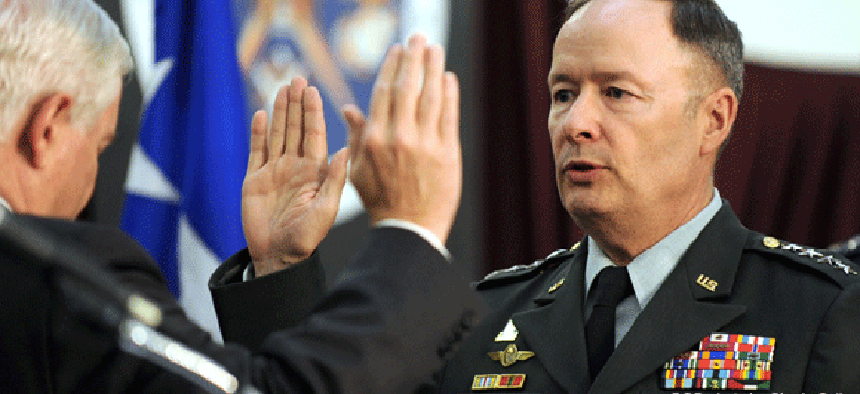Getting harder to trust Alexander's NSA


Connecting state and local government leaders
Gen. Keith Alexander insists that the NSA needs public and industry support to do its job, but his lack of transparency makes it hard to keep the faith.
“I need you,” National Security Agency Director Gen. Keith Alexander said several times to his audience at the National Press Club Wednesday. He needs the support of industry and the public in order to protect the nation from cyberattacks and terrorism in the face of growing concern over his agency’s wholesale collection of domestic data.
Alexander also spoke about the need to migrate the Defense Department’s 15,000 network enclaves to a more defensible architecture based on a thin, virtual cloud environment and about the need for legislation spelling out clear rules of engagement for protecting civilian cyber infrastructure and for cyber threat information sharing. But most of his talk focused on troublesome media leaks that threaten to hogtie the agency.
Data culled from the nation’s telephone and Internet carriers is crucial to thwarting foreign attacks, he said, but these programs are being threatened by what he called sensationalized and inflamed stories coming from the leaks.
“Talk about the facts,” he pleaded. “We need to get the facts out about why we need these tools.”
He then proceeded to give his latest version of the facts. But it is getting harder to trust him when his version has to be updated every month in the wake of new revelations about NSA activities. This is a shame, because it is getting in the way of the NSA’s genuinely important work of gathering foreign intelligence and protecting the government’s cyber infrastructure.
“I promise you the truth,” Alexander said back in July during his opening keynote address at the Black Hat Briefings. One of those truths was that “no one at NSA has ever gone outside the boundaries we’ve been given,” in its collection and analysis of domestic data.
Well, not exactly. Two months later, speaking at the Billington Cybersecurity Summit in Washington on Sept. 25, he acknowledged 12 willful violations of the agency’s legal authority. However, “we held ourselves accountable and we reported it,” he said. But not to the American people or to Congress until after it was publicly reported in August.
And then there were the 2,776 “incidents” that came out in the August release of declassified secret court records. These were just mistakes, he said in September, and “if we make a mistake, we self-report it in every case.”
“Self-reporting” at the NSA apparently means reporting to itself, because it didn’t report this to the public or to Congress.
Alexander, as usual, mentioned his 15 grandchildren during his talk. If you can’t trust a guy with 15 grandchildren, who can you trust? But he seemed unusually subdued. It could have been the recent dental surgery that had left one side of his jaw a little swollen. But it also might have been the three months of stress from the drip, drip, drip of revelations from those leaks. Publicly defending an agency that has spent decades in the shadows must be unnerving.
“We do the right thing in every case,” he said. “We’re trying to be more transparent.” That would be easier to believe if he didn’t have to update his version of the truth every month.
NEXT STORY: NIST updates guidelines for securing the DNS




